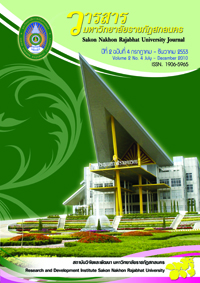ลวงลุ่มน้ำโขง : การเปลี่ยนแปลงพื้นที่ทางเศรษฐกิจและสังคมของชุมชน บริเวณพรมแดนไทย-ลาว
Abstract
บทคัดย่อ
บทความนี้เป็นการนำเสนอผลการศึกษาแบบชาติพันธุ์วรรณนา (Ethnography) ในพื้นที่ชุมชน บริเวณพรมแดนไทย-ลาว โดยมีจุดมุ่งหมายเพื่อศึกษาการเปลี่ยนแปลงพื้นที่ทางเศรษฐกิจและสังคมของชุมชน ไทย-ลาวบริเวณลวงลุ่มน้ำโขงภายใต้บริบทรัฐชาติสมัยใหม่ โดยใช้แนวคิดพื้นที่ (Space)กับแนวคิดเรื่อง พรมแดน (Boundary) เป็นแนวทางสำคัญในการศึกษา ผู้วิจัยต้องการชี้ให้เห็นว่า พื้นที่ลวงลุ่มน้ำโขงบริเวณ พรมแดนไทย-ลาวไม่ได้มีสถานะเป็น“พื้นที่ทางกายภาพ” (Physical Space) สำหรับหาปลาในบริเวณแม่น้ำโขง แต่เพียงอย่างเดียว แต่อยู่ในสถานะ “พื้นที่ทางเศรษฐกิจและสังคม” (Socio-Economic Space) ที่ถูกสร้างขึ้น เป็น พื้นที่ที่มีความยืดหยุ่นและลื่นไหลบนพรมแดน (Boundary) ระหว่างรัฐชาติไทยกับลาว รวมทั้งเป็นพื้นที่ที่ถูก ช่วงชิง (Contested Space) จากอำนาจรัฐ นายทุนและชุมชนในท้องถิ่น อันเนื่องมาจากการกำหนดเส้นแบ่ง พรมแดนที่เกิดขึ้นพร้อมกับ “แผนที่” จากความเป็นรัฐชาติสมัยใหม่ในช่วงอาณานิคมฝรั่งเศสเข้าปกครองลาว อย่างไรก็ตามชาวบ้านทั้งสองฝั่งโขงก็มิได้ยอมจำนนต่ออำนาจรัฐที่ทับซ้อนลงบนพื้นที่ของชุมชนเสมอไป แต่มี “ปฏิบัติการ” เพื่อปรับเปลี่ยนความสัมพันธ์ให้ “อำนาจของชุมชน” กลับลงทับซ้อนกับพื้นที่ของอำนาจรัฐได้อีกเช่นกัน
Abstract
This article presents the study on the ethnography of the communities at Thai-Laos boundary. Its aim is to examine the socio-economic change of the communities located along the Mekong River, the border between Thailand and Lao PDR. The concept of space and boundary is employed as the key method to conduct this study. This research desires to indicate that the Luang space in the Thai-Laos boundary is not only a physical space where people can do fishing, but as the status of the socio-economic space. It is a flexible area in Thai-Lao bordering area, as well as a contested space caused by governmental power, upholders, and local communities; this disputed borderline was originated from the state of being a modern nation state during the French colonization of Laos. Yet the people living on both sides of the river do not surrender to government power. Conversely they have undergone an “operation” to reinforce their “community power” to overlap the political power.









